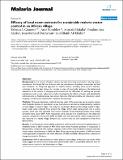| dc.contributor.author | Bomblies, Arne | |
| dc.contributor.author | Dafalla, Mustafa | |
| dc.contributor.author | Issa-Arzika, Ibrahim | |
| dc.contributor.author | Duchemin, Jean-Bernard | |
| dc.contributor.author | Gianotti, Rebecca Louise | |
| dc.contributor.author | Eltahir, Elfatih A. B. | |
| dc.date.accessioned | 2010-09-29T15:01:05Z | |
| dc.date.available | 2010-09-29T15:01:05Z | |
| dc.date.issued | 2008-07 | |
| dc.date.submitted | 2008-03 | |
| dc.identifier.issn | 1475-2875 | |
| dc.identifier.uri | http://hdl.handle.net/1721.1/58753 | |
| dc.description.abstract | Background: Larval control of malaria vectors has been historically successful in reducing malaria transmission, but largely fell out of favour with the introduction of synthetic insecticides and bed nets. However, an integrated approach to malaria control, including larval control methods, continues to be the best chance for success, in view of insecticide resistance, the behavioural adaptation of the vectors to changing environments and the difficulties of reaching the poorest populations most at risk,. Laboratory studies investigating the effects of neem seed (Azadirachta indica) extracts on Anopheles larvae have shown high rates of larval mortality and reductions in adult longevity, as well as low potential for resistance development. Methods: This paper describes a method whereby seeds of the neem tree can be used to reduce adult Anopheles gambiae s.l. abundance in a way that is low cost and can be implemented by residents of rural villages in western Niger. The study was conducted in Banizoumbou village, western Niger. Neem seeds were collected from around the village. Dried seeds were ground into a coarse powder, which was then sprinkled onto known Anopheles larvae breeding habitats twice weekly during the rainy season 2007. Adult mosquitoes were captured on a weekly basis in the village and captures compared to those from 2005 and 2006 over the same period. Adult mosquitoes were also captured in a nearby village, Zindarou, as a control data set and compared to those from Banizoumbou. Results: It was found that twice-weekly applications of the powder to known breeding habitats of Anopheles larvae in 2007 resulted in 49% fewer adult female Anopheles gambiae s.l. mosquitoes in Banizoumbou, compared with previous captures under similar environmental conditions and with similar habitat characteristics in 2005 and 2006. The productivity of the system in 2007 was found to be suppressed compared to the mean behaviour of 2005 and 2006 in Banizoumbou, whereas no change was found in Zindarou. Conclusion: With a high abundance of neem plants in many villages in this area, the results of this study suggest that larval control using neem seed powder offers a sustainable additional tool for malaria vector control in the Sahel region of Niger. | en_US |
| dc.description.sponsorship | Massachusetts Institute of Technology. IDEAS competition | en_US |
| dc.description.sponsorship | MIT-France | en_US |
| dc.description.sponsorship | United States. National Oceanic and Atmospheric Administration. Oceans and Human Health Initiative | en_US |
| dc.publisher | BioMed Central Ltd | en_US |
| dc.relation.isversionof | http://dx.doi.org/10.1186/1475-2875-7-138 | en_US |
| dc.rights | Creative Commons Attribution | en_US |
| dc.rights.uri | http://creativecommons.org/licenses/by/2.0 | en_US |
| dc.source | BioMed Central Ltd | en_US |
| dc.title | Efficacy of local neem extracts for sustainable malaria vector control in an African village | en_US |
| dc.type | Article | en_US |
| dc.identifier.citation | Malaria Journal. 2008 Jul 23;7(1):138 | en_US |
| dc.contributor.department | Massachusetts Institute of Technology. Department of Electrical Engineering and Computer Science | en_US |
| dc.contributor.mitauthor | Gianotti, Rebecca Louise | |
| dc.contributor.mitauthor | Bomblies, Arne | |
| dc.contributor.mitauthor | Dafalla, Mustafa | |
| dc.contributor.mitauthor | Eltahir, Elfatih A. B. | |
| dc.relation.journal | Malaria Journal | en_US |
| dc.eprint.version | Final published version | en_US |
| dc.type.uri | http://purl.org/eprint/type/JournalArticle | en_US |
| eprint.status | http://purl.org/eprint/status/PeerReviewed | en_US |
| dc.date.updated | 2010-09-03T16:19:16Z | |
| dc.language.rfc3066 | en | |
| dc.rights.holder | Gianotti et al.; licensee BioMed Central Ltd. | |
| dspace.orderedauthors | Gianotti, Rebecca L; Bomblies, Arne; Dafalla, Mustafa; Issa-Arzika, Ibrahim; Duchemin, Jean-Bernard; Eltahir, Elfatih AB | en |
| mit.license | PUBLISHER_CC | en_US |
| mit.metadata.status | Complete | |
